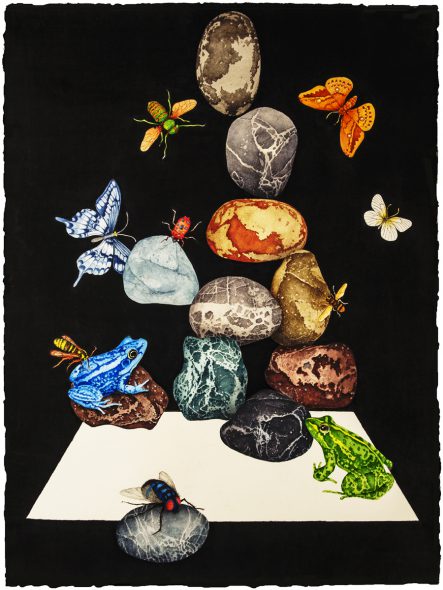*to read this article on the Urban Milwaukee website please click HERE
Sweet and Sour and Slightly Surreal
Painter Mary Alice Wimmer and sculptor Jessica Calderwood may charm and perplex you.
By Catherine Jozwik - Jun 20th, 2019 03:12 pm
The Tory Folliard Gallery is ushering in summer with two new exhibitions by painter Mary Alice Wimmer and metalworker and sculptor Jessica Calderwood.
On display through July 6, Wimmer’s “New Paintings” and Calderwood’s “New Sculpture” feature fine detail, vivid color, social commentary and, according to gallery assistant director Rebecca Sidman, elements of absurdity.
“Both of (the exhibits) dip into the surreal. They have these elements that we like at the gallery,” Sidman noted.
Wimmer’s clearly defined paintings, with sharp lines and keen detail, are influenced by Victorian-era cabinets of curiosities, or collections of geological, archaeological, and antique items, artwork, and general oddities. Wimmer’s exhibit, which also includes four silverpoint drawings of animal skulls and cups on a table, is also reminiscent of Victorian natural history sketches and paintings.
With black matte backgrounds inspired by Dutch still life paintings, Wimmer’s eight vibrant watercolors, containing birds, butterflies and other insects, frogs, vegetables, and natural materials like rocks, birds’ nests and eggs, appear even more striking. The stark color contrasts also serve to illustrate the artist’s tribute to Vanitas art, Dutch still life paintings of the 16th and 17th centuries which depicted objects associated with wealth, pleasure and death in order to symbolize the impermanence of life, the fleeting nature of pleasure, and the finality of death. Many of Wimmer’s paintings, including “Nightshade” and “The Blue Thread,” showcase red and green peppers, blue frogs, and brightly-colored butterflies and rocks suspended in space, floating, like thoughts or bits of a dream.
Wimmer, a retired professor emerita of printmaking, painting and drawing at University of Wisconsin colleges, has won many teaching and painting awards. Her works are part of numerous private and museum collections, including Madison’s Chazen Museum of Art and Museum of Contemporary Art, and the Milwaukee Art Museum.
In her exhibit “New Sculpture,” Calderwood employs notions of blankets, drapery and social media as metaphors for comfort, respite, and the safety of anonymity.
A painter and metalsmith, Calderwood incorporates a number of different media and craft materials in her works, including enamel, porcelain, and flock (a powder which gives items a velvety texture). Her seven sculptures feature blankets, drapes and other coverings concealing everything but pairs of legs, in argyle socks or high heels. “Balance,” for example (copper, rayon flocking, porcelain, enamel, and polymer clay) portrays a pair of legs wearing black high-heeled shoes, standing near the edge of a copper box. The figure’s hidden torso and upper body seems to be holding up a round table, covered with a light blue velvety tablecloth. On top of the table sits a plate with a miniature plastic orange and apple. Could the figure be exhausted at having to keep up the appearance of a “perfect” home?
Although many of Calderwood’s works highlight female figures with faces obscured by plants and inanimate objects like pearls, three out of four of her wall pieces in the exhibit focus on children, with faces covered up by iPads and other electronic devices. In works such as “Waiting Room,” the children sit together, but immerse themselves in modern technology.
What does it all mean? Calderwood offers this is an artistic statement: “Within the context of the home, drapery can also refer to comfort, rest, solace. Electronic media has also become our space’ to offer this comfort. For this work, I use both devices of drapery and electronic media to negate, censor and reveal what it is to be a human in the 21st century.”
The dual exhibit by these two artists is well worth seeing.


